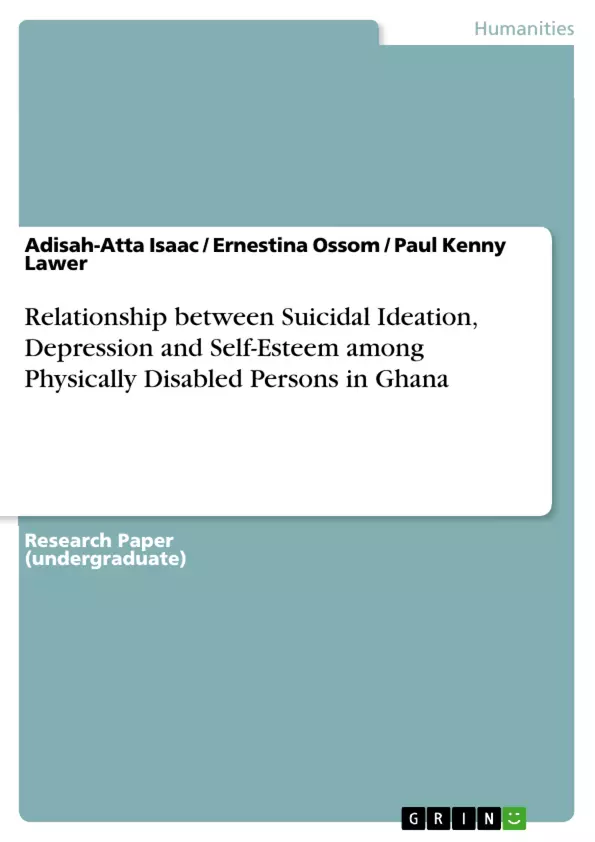The study aimed at examining the relationship between self-esteem, depression and suicidal ideation among the physically disabled in Ghana. Purposive sampling was used to select one Hundred and Eighty (180). Specifically, sixty (60) participants who are visually impaired, sixty (60) who have hearing impairment and sixty (60) who have mobility impairment were selected for the study respectively. In view of this, two hypotheses were stated and tested using the statistical package for social sciences (SPSS). Hundred and eighty (180) questionnaires were distributed. A modified version Beck Depression Inventory (BDI) was used to test the depression level of the participant’s level of depression. Suicidal ideation was measured by using Positive and Negative Suicidal Ideation (PANSI) with 14 items self-report instrument. The outcome of the study revealed that:1. Self-esteem and depression related significantly with suicidal ideation. 2. Physical disability type had a significant influence on self-esteem and depression. 3.Mobility impaired had higher self-esteem than those who are visually impaired. 4. There was no significant difference between hearing impaired and visually impaired on depression. 5.There was no significant difference between mobility impaired and hearing impaired on suicidal ideation.
Inhaltsverzeichnis (Table of Contents)
- INTRODUCTION
- Background of the Study
- Theoretical Approach
- EMPIRICAL REVIEW OF RELATED STUDIES
- METHODOLOGY
- RESULTS
- Introduction
- Hypotheses Testing
- Hypotheses One and five
- Hypothesis two, three and four
- DISCUSION OF RESULTS
- CONCLUSION
- Limitations of the Study
- RECOMMENDATION
Zielsetzung und Themenschwerpunkte (Objectives and Key Themes)
This study examines the relationship between self-esteem, depression, and suicidal ideation among physically disabled individuals in Ghana. It investigates how these factors are affected by different types of disabilities (visual, hearing, and mobility impairments) and aims to provide insights into the unique challenges faced by this population.
- The relationship between self-esteem, depression, and suicidal ideation among individuals with physical disabilities.
- The influence of different types of physical disabilities on self-esteem and depression.
- The prevalence of suicidal ideation and its potential predictors among people with disabilities.
- The role of the Interpersonal-Psychological Theory of Suicide in explaining suicidal ideation among individuals with disabilities.
- The unique challenges and experiences of individuals with disabilities in Ghana.
Zusammenfassung der Kapitel (Chapter Summaries)
Introduction: This chapter provides a comprehensive overview of the study, including the background, theoretical approach, and objectives. It highlights the prevalence of disabilities in Ghana and the existing literature on the relationship between disability, self-esteem, depression, and suicidal ideation.
Empirical Review of Related Studies: This chapter presents a review of existing research related to suicidal ideation, depression, and self-esteem among individuals with and without physical disabilities. It summarizes key findings from various studies, emphasizing the correlation between these factors.
Methodology: This chapter describes the research methods employed in the study, including the sample selection, data collection procedures, and statistical analyses used to test the hypotheses.
Results: This chapter presents the findings of the study, including the results of the statistical analyses conducted to examine the relationship between self-esteem, depression, suicidal ideation, and different types of physical disabilities. The results are presented in a clear and concise manner, highlighting the key findings and their implications.
Discussion of Results: This chapter interprets the findings of the study in the context of existing literature and provides insights into the implications of the results for understanding the relationship between disability, self-esteem, depression, and suicidal ideation. The discussion also considers the limitations of the study and suggests areas for future research.
Conclusion: This chapter summarizes the key findings of the study, reiterates its contributions to the field, and discusses the implications of the research for policymakers, practitioners, and individuals with disabilities. It also addresses the limitations of the study and suggests future directions for research.
Schlüsselwörter (Keywords)
The primary focus of this research lies on the relationship between self-esteem, depression, and suicidal ideation among individuals with physical disabilities in Ghana. The study utilizes the Interpersonal-Psychological Theory of Suicide to understand the underlying factors contributing to suicidal ideation, specifically focusing on perceived burdensomeness and thwarted belongingness. Key terms include physical disability, self-esteem, depression, suicidal ideation, Ghana, Interpersonal-Psychological Theory of Suicide, perceived burdensomeness, and thwarted belongingness.
Frequently Asked Questions
What was the primary goal of the study in Ghana?
The study aimed to examine the relationship between self-esteem, depression, and suicidal ideation among physically disabled persons in Ghana.
Which theoretical approach was used to understand suicidal ideation?
The study utilized the Interpersonal-Psychological Theory of Suicide, focusing on factors like perceived burdensomeness and thwarted belongingness.
How did disability type influence self-esteem?
The results showed that mobility-impaired individuals had higher self-esteem compared to those with visual impairments.
Was there a significant link between depression and suicidal ideation?
Yes, the study revealed that both self-esteem and depression are significantly related to suicidal ideation among the participants.
What was the sample size and composition of the study?
The study included 180 participants, divided equally into three groups: 60 visually impaired, 60 hearing impaired, and 60 mobility impaired individuals.
- Citation du texte
- Adisah-Atta Isaac (Auteur), Ernestina Ossom (Auteur), Paul Kenny Lawer (Auteur), 2016, Relationship between Suicidal Ideation, Depression and Self-Esteem among Physically Disabled Persons in Ghana, Munich, GRIN Verlag, https://www.grin.com/document/355239



